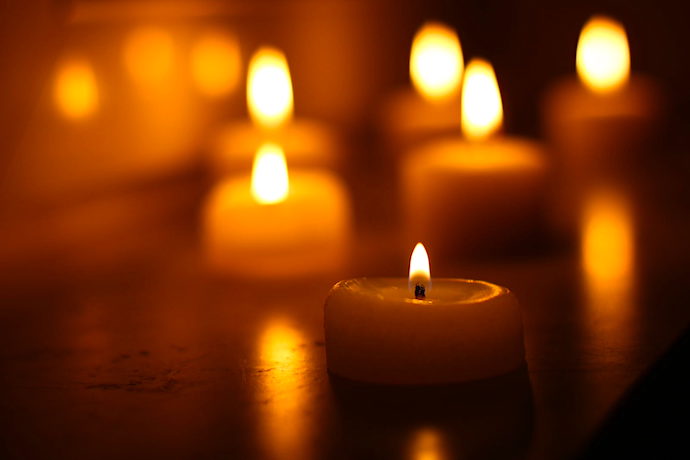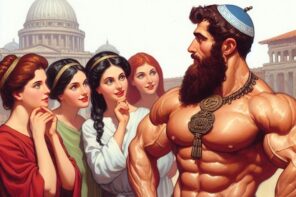I am a Jew. And I am alive. As a scholar of Judaism I spend my days reading, writing, thinking about, and teaching about dead Jews. So I guess I love dead Jews. But I’m not the “people” Dara Horn is referring to in her new book People Love Dead Jews. The “people” in the title are not Jews, but non-Jews. Non-Jews of all sorts and from many places; China, America, the Soviet Union, Syria etc. Many locales where Jews once lived, and sometimes still live, but were also banished from or murdered. And then memorialized.
People Love Dead Jews is a book about collective victimhood and the inability to disentangle from it. Not circumstantial victimhood, not situational victimhood, but systemic victimhood. The premise is that people—not everyone of course—but all kinds of people in all kinds of places, throughout all periods of history, sometimes embraced Jews, until they didn’t. That “people” prefer their Jews…dead.
In fact, in reading Horn’s book one might think the only thing that all peoples share, from Russia to America, from Manchuria to Jersey City, is that they love dead Jews. Dead Jews is the subject of the book; not, mind you, antisemitism, but literally: dead Jews. That seems to be for Horn the common denominator of human civilization.
Of course, this book is written by a person with the best education in the world, in a free country where her Jewishness is not only protected, but where the president just appointed a special envoy to fight antisemitism (and, it’s worth noting, where there’s no special envoy to fight racism or Islamophobia). Why would an upwardly-mobile talented writer of fiction from the belly of American suburbia with a PhD in Yiddish literature from Harvard write a book about how everyone, everywhere, sooner or later hates Jews, banishes or kills them, and then memorializes them? And how is it that such a book becomes an instant bestseller?
What is perhaps most striking about Horn’s book isn’t the book itself (more on that below) but how badly Jews want to read it. That is, how Jews seem to love to read about how people love dead Jews. It sounds kind of ghoulish, but it’s true. The comments on the reviews on Amazon are off the charts, almost in a macabre way; it made me feel strangely uncomfortable reading them. It’s as if they’re all saying, in myriad ways, “you see, we were right, everyone hates the Jews.” Jews seem to love to have that inherited anxiety confirmed. In some way, and herein lies the problem, it is presently the most successful answer to the question, “why be Jewish?”
Horn is undoubtedly a gifted writer and storyteller, and a superb researcher. She travelled the globe to find all the places where people once loved their Jews, until they didn’t. From the city of Harbin in Manchuria to Pittsburgh. She tells a moving tale of reading Shakespeare’s The Merchant of Venice with her young son and wonders why he’s not as disturbed by its antisemitism as she is. She takes a virtual tour of a now destroyed synagogue in Damascus that has been virtually reconstructed for internet viewers, in all its grandeur and majesty—and not by Jews! She tells a powerful story of Varian Frye, an American who risked his life to save Jews—mostly Jewish intellectuals and artists—from the Holocaust, only to be forgotten by the many Jews he saved. In some way Frye for her is the exception that proves the rule. Or is it that he challenges her thesis?
Compelling stories, laconic, and beautifully constructed with a gifted hand. But also pretty disturbing, not because the outcome is always the same—Jews are killed and those who killed them memorialize them—but because the project itself speaks to a deep-seated problem of Jews today: the most successful way to convince someone to be a Jew is to tell them that everyone hates them, promoting a kind of Negative Judaism.
Looking at the world through tear-streaked glasses
I want to address this problem by making three points. The first is that Horn’s book is really part of a new genre one might call, “Anti-antisemitism literature.” These works mostly constitute a telling of Jewish history and the history of antisemitism as the same thing. One thing so disappointing about this genre is what it forgets. Or more precisely: who it forgets.
One of the greatest Jewish historians of the twentieth century, a giant in scholarship and stature, was Salo Baron, who held the first chair in Jewish history at an American University (Columbia University). Baron trained generations of students who rose in the ranks of American academe. Baron dedicated much of his career to correct what he felt was an inaccurate assessment of Jewish history as “lachrymose.”
The lachrymose approach presented Jewish history as just one bloody antisemitic act after another. This approach was quite common, espoused especially by Zionist historians and historiographers such as Yitzhak Baer, Ben Zion Dinur, Ben Zion Netanyahu, and a cadre of others. The stated agenda was pretty simple: the diaspora is bad for the Jews, even when it seems good, and the only way to ensure safety is for Jews to have a state of their own. It constituted what one might call a “negation of the diaspora” historiography.
Baron, who did consider himself a Zionist, argued against this approach on historical grounds and argued in many scholarly and popular studies that, while antisemitism was an endemic problem for Jews throughout history, there were long periods of time in many locales where Jews lived fairly secure lives. No, they were not equal to their Christian or Muslim neighbors, but they weren’t hounded either. They weren’t always rich, though some were, but they weren’t always destitute either. In other words, severe cases of antisemitism were periodic, not systemic.
Baron’s approach certainly evoked resistance and critique, and the scholarly world has been working through Baron and his critics for decades. But what one sees from Horn and others is that, in the popular imagination at least, it’s as if Salo Baron never existed. His critique of lachrymose history seems to have simply vanished from the popular scene. One could only imagine how Baron would have responded to People Love Dead Jews even if he didn’t contest one historical claim.
Even if the research were impeccable, as it seems to be, the nature of the project isn’t merely historically skewed, but its popularity also speaks to a deep inability for much of Jewish culture to think beyond the notion that everyone, everywhere, eventually hates them. Why? That question is never quite answered. Or perhaps better put, it’s answered in many unconvincing ways.
Why be normalized
The second point that’s troubling about this book is that the very mentality it implicitly espouses, that the centrality of Jew-hatred is the source of Jewish identity (that may not have been why Horn wrote the book but it’s certainly the way it’s being read) is precisely what David Ben Gurion thought Zionism would eradicate.
The project of normalization within the state of Israel was supposed to procure normalization for Jews everywhere. Normalization meant that Jews would no longer see themselves primarily—certainly not exclusively or preternaturally—as victims of history but rather as part of it. That re-entering history didn’t only mean power but also a belief that Jews were basically like everyone else (k’khol ha-amim).
This did not happen, and not only because others refused to see Jews that way, but because the Jews couldn’t let go of their own victimhood. In fact, as the state of Israel and its supporters have consistently demonstrated, they’ve simply adopted a victim’s stance to justify their newfound political power. Recall Israel’s Deputy Foreign Minister equating the borders of Israel with the fences of Auschwitz.
Today it’s not the hapless disenfranchised homeless wanderers, but the politically viable nation-state, that’s hated. And, according to this mentality at least, for the very same reasons. Because they’re Jews. Ergo, anti-Zionism is antisemitism. This is the problem that generates the seemingly insatiable need for books like People Love Dead Jews.
Curiously, Horn doesn’t write much about Israel in her book, except for a few romantic childhood memories that could have been plucked from Leon Uris’ Exodus. Her book isn’t “political.” But it doesn’t have to be political to be politicized. If people love dead Jews, they love them in the diaspora and they love them in Israel—it really doesn’t matter. And thus even those “people” who today “love” Israel will eventually prefer to see them dead. In short, as Horn sees the world, Zionism is ironically a failure.
Fear is the new middlebrow
The third point takes us back to the middle of the twentieth century, just after the end of the Second World War and the Holocaust. As Rachel Gordan has recently and persuasively shown, in those decades there were a plethora of books about Judaism written for a popular audience, what Gordan calls Jewish middlebrow literature. This included front page cover stories about Judaism in Life Magazine, Reader’s Digest and other popular venues. Some titles are still familiar today, for example, Milton Steinberg’s As a Driven Leaf and Basic Judaism; Irving Howe’s World of My Fathers; and Herman Wouk’s This is My God.
These books were written for both Jews and Christians; to educate Jews about their religion, and to introduce Christians to Judaism outside whatever they may have learned in Sunday school. They mostly illustrated the moral values of Judaism, explaining its seemingly arcane practices like dietary laws, and created what Gordan calls “Judaism as an American religion.” From about 1945-1960 over 40 such volumes were published not including cover stories in major national magazines.
The basic Judaism genre seems today to be replaced with books like Horn’s People Love Dead Jews. Books about antisemitism lurking here, there, and everywhere. Almost every month another title that quickly climbs the charts. Middlebrow books recounting the Greatest Hits of Jew hatred. With Google, it’s quite easy to do. But to what end? And here Horn’s book is sadly a well-written addition to the growing body of literature that seems to be driving Jewish identity. If there’s another take-away from Horn’s book, I must have missed it.
Horn curiously chooses to end her well-crafted stories about loving dead Jews with, well, loving dead Jews of a different sort. She tells a quasi-nostalgic, quasi-cynical story about daf yomi, an international program of studying one page of Talmud per day and finishing the entire Babylonian Talmud in seven years. The culmination of this considerable feat is celebrated world-wide in schools, synagogues, and stadiums, made up of mostly Orthodox men.
Interestingly, the idea was conceived by R. Meir Shapiro in 1923 in Poland. Shapiro envisioned the widespread study of a page of Talmud on a pretty superficial level as a way to create cross-cultural conversation among Jews, a way for Talmud to become part of the daily chatter of Jews unable to devote their entire day to study. It was a brilliant idea and widely successful, far more than Shapiro could have imagined.
For Horn, the Talmud is the testament of dead Jews and daf yomi is how Jews love them. One page every day. So we’ve come full circle. Loving dead Jews isn’t necessarily a bad thing. If you’re a Jew. In fact, it’s the very quintessence of Torah study, the centerpiece of Jewish life. But then there are the “other people,” meaning basically everyone else, sooner or later. They don’t love the dead Jews of the Talmud. They love the dead Jews who love the dead Jews of the Talmud.
But who really cares about the Talmud? Certainly not the people who love dead Jews. And certainly not most Jews. People Love Dead Jews has only about ten pages about the Talmud, and even these don’t really tell us all that much other than that some Jews seem to love it. But you don’t have to love Talmud for people to love dead Jews. That’s not required. As Horn tells it, all you have to do is be a Jew. So then why do I need Talmud, I might as well be a Jew because people hate me? And therein lies the problem.
The great scholar of Judaism Jacob Neusner once said, and I paraphrase, “If the Jews can’t somehow get beyond the Holocaust, they will survive. But they just won’t be a very interesting people.” Horn’s People Love Dead Jews sadly makes a convincing case that Neusner was on to something.





